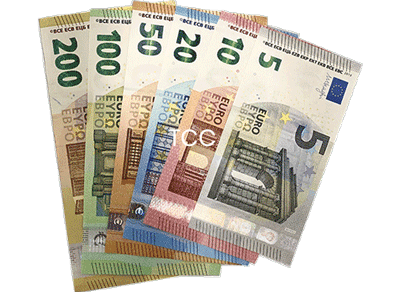- |
- Business
- Compare Exchange Rates
- |
- |
- Reviews
- |
- Help
- |
- Contact Us
- |
- Blogs
- |
- Currency Converter


Sending money from one country to another is a daily affair, especially if you are running a business. However, before transferring any funds overseas, you must follow certain protocols to ensure successful transactions.
For instance, post-Brexit, FCA issued certain changes in UK's Funds Transfer Regulations, including for cross-border transactions. Therefore, if you are a resident of the UK looking for the fastest and safest way for European money transfer to the EU, here is a detailed guide for you!

Mainly, there are three most common ways for European money transfer from the UK to EU countries. Let's discuss them in detail with their pros and cons.
It is one of the most popular and safest ways to transfer European money from the UK to EU countries. A bank transfer is a preferred way for regular payments. People usually choose bank transfers to send money overseas because of their reliability and the facility to set up recurring payments.
However, European money transfer through banks has certain drawbacks. For example, you may not get the most competitive currency rate in this case and banks levy certain charges in some cases.
For instance, any transfer from the UK to EEA over EUR 1,000 must have the following information:
Names of the payee and payer
Their payment account number
The payer's date and place of birth, address, customer identification number and official personal document number
Besides, in all cases, the PSPs of both the UK and EU countries have risk-based procedures to receive funds with missing information.
Let's summarise the pros and cons of bank transfers for payment from the UK to EU countries!
Pros
One of the safest methods of transferring funds.
Best for small and mid-range payments.
You can set up regular transactions.
Your money will be protected through the Financial Services Compensation Scheme when you initiate the payment from a UK bank. It will ensure that your money is safe even if the bank faces any problems.
Most banks offer 24/7 online banking facilities.
You can transfer up to £100,000 or an equivalent amount in EUR to EU countries. However, it depends on the banks you choose and their daily transaction limit.
Cons
It is not cheap.
The exchange rate is not the most competitive, especially for large payments over £5000.
The banks usually take 4 to 6 days to process the transaction.
Some banks may levy additional charges for international transfers, fast transfers, etc.
The fund transfer process from the UK to EU countries may vary with banks. However, you must have a UK bank account, and the recipient must have an overseas one.
Other details you need during the process are:
Your account information
Name and address of the beneficiary
Bank Code or Branch Identifier Code (BIC) of the recipient
The International Bank Account Number (IBAN) of the beneficiary
Your beneficiary's country name
The amount you want to pay
The reason for the payment
Let's move on to the next option for European money transfers.
If you want to send funds quickly overseas or to any EU country from the UK, money-transferring firms can be a great resort. They also allow you to transfer money conventionally to the beneficiary's phone or hand over cash to them safely through the company agent residing in that country. Usually, these firms offer competitive exchange rates and do not charge additional when selling euros to pounds.
However, note that your money will not be covered by any compensation schemes for such transfers. Hence, it is better to send a smaller amount, less than £5000, through money transfer firms.
Let's take a look at the pros and cons of this European money transfer option.
Pros
Ensures fast transfers
Usually, they do not charge extra for payment within the EU
Best for small amounts
Exchange rates are competitive
You can transfer money through your bank account, debit or credit cards
You can send funds of up to £50,000 or equivalent in your currency in one transaction if you satisfy their quality check
Transactions are usually made online or over the phone.
Cons
Additional fees are higher than banks
The verification process against your account takes from 2 to 4 days upon sign-up
There is no compensation plan for the amount to be transferred
The process to transfer money from Euro to Pound countries is as follows:
1. Sign up to the website of the money transferring firm you want to choose for the transaction.
2. After verification of your identity and address, choose if you want to pay through your bank account, debit or credit card.
3. Choose the country you wish to send money.
4. Check the available option of how your beneficiary will get the money (to a bank account or on the phone or cash-pickup)
5. Now send the money and check how many days it will take to complete the process.
Depending on your option to send money, your beneficiary will receive the amount within 2 to 4 days. Note that every country has different rules so the processing time may differ.
This is a great option for overseas large and one-off money transfers. If you want to make payments for large purchases or overseas mortgages, foreign exchange brokers are ideal for you.
This option is perfect for transactions over £3000. The exchange rates are more competitive than the banks and money transfer firms. Generally, their additional fees are very low. You can also save significantly while transferring a large amount to EU countries.
Pros
Great for large payments
Zero to low charges below the transaction amount of £3000
Highly competitive exchange rates
One of the fastest ways to transfer European money
Offers bank account transfer or cash-pickup
You can avail of 24/7 services
You can also choose priority payment for faster transactions
The payments take 1 to 2 days to arrive
Cons
The protection of the money is lesser than banks
The fees are higher for amounts over £1000
Be aware of regular exchange rates to avoid paying extra
Follow the steps below for European money transfers from the UK to EU countries:
1. Open an online account with your preferred broker
2. Complete the verification process
3. State the amount you want to send
4. Negotiate for the most competitive exchange rate
5. Provide them with the details of your beneficiary
6. Once the money is received, you will get a confirmation stating the same
Depending on the country and broker, the process takes a few minutes to a few days.
Things to Note
You can choose any of the three options for European money transfer from the UK to an EU country. However, note that the recipient may be charged certain fees while receiving the amount. However, you can also choose to pay these fees beforehand if applicable.
Likewise, when choosing a firm or broker, make sure that it is authorised or registered with the UK Financial Conduct Authority. Remember that the firms or brokers are not covered by a compensation scheme like banks unless it is stated on their portal.
Considering all these factors, choose a reliable organisation like Currency Club, and ensure a seamless European money transfer process.

We have made every effort to ensure that the information published here is correct and accurate, however you should check and confirm the latest exchange rates with The Currency Club directly prior to making a decision. The information published is general and does not consider your personal objectives, financial situation or particular needs. Full disclaimer available